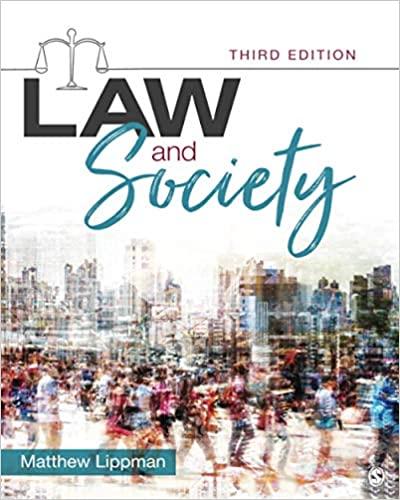Question
Simon Tam, the front man for the rock band, The Slants, wanted to register the band's name with the U.S. Patent and Trademark Office. The
Simon Tam, the front man for the rock band, The Slants, wanted to register the band's name with the U.S. Patent and Trademark Office. The examiner denied the registration because of a 70-year-old provision in the Lanham Act (15 U.S.C. 1052) that prohibited the registration of names and marks that are disparaging, "immoral," or "scandolous." Mr. Tam appealed the denial, and he had some fairly high-poweredamici(friends of the court) on his side, including the Washington Redskins, themselves in a battle of survival for their trademark.
Initially, the federal court of appeals for the federal circuit upheld the denial by the U.S. Patent and Trademark office. However, upon rehearing, the court held that the trade name should not have been denied. [In reTam, 785 F.3d 567 (Fed. Cir. 2015), and In reTam,808 F.3d 1321 (Fed. Cir. 2015)]
The argument that Mr. Tam made successfully was that the Lanham restriction was a violation of the First Amendment. In a 2-to-1 decision, the court held that "the First Amendment forbids government regulators to deny registration because they find the speech likely to offend others." The court held that the First Amendment protects speech "even when the speech inflicts great pain." Some examples of the types of registrations cited by the court as painful but protected included the following:
- "Stop the Islamisation of America"
- "Mormon Whiskey"
- "Khoran" as a name for a wine
- "Christian Prostitute"
- "Amoshhomo"
- "Ride Hard Retard"
- "Have you heard that Satan is a Republican?"
- "Democrats shouldn't breed"
- "Republicans shouldn't breed"
There are other cases, such as that of the Washington Redskins, pending that have the First Amendment challenge at the heart of their cases. Five Native Americans brought the suit asking for cancelation of the "redskins" name and symbol. [Pro-Football, Inc. v Blackhorse, 112 F. Supp. 3d 439 (E.D. Va. 2015)] The lower court canceled the trademark. The Washington Redskins have appealed. A New York lunch wagon company lost its case against the state of New York for denying it a permit to operate in the state lunch wagon area on the grounds that its company name was offensive. [Wandering Dago, Inc. v Destito, 2016 WL 843374 (N.D. N.Y. 2016)] These conflicts in decisions mean that the U.S. Supreme Court will, at some point, need to review one of the cases to determine the constitutionality of the Lanham Act provisions.
Companies also have the right to stop Internet sales that are not by authorized distributors. For example, inAustralian Gold, Inc. v Hatfield, 436 F.3d 1228 (10th Cir. 2006), ETS Inc., like most beauty supply companies, sold its tanning products primarily through tanning salons. ETS, like most beauty suppliers, has distribution contracts that limit sales to beauty and tanning salons. ETS does not want its products to be available in stores because of the need for in-person consultation on their use and application. The Hatfields used a series of fictitious names to purchase ETS products through distributors and then made the products available on theInternet through seven different websites. The seven websites used the ETS trademark, product pictures, and metatags. ETS recovered $3.7 million for infringement because of the unauthorized use of the trademark and the resulting diversion of Internet traffic and sales to the Hatfields. Use of a trademark on the Internet without permission brings the resulting profits back to the owner.
The Court found that the "First Amendment forbids government regulators to deny registration because they find the speech likely to offend others".In re Tam, 785 F.3d 567 (Fed. Cir. 2015) and 808 F.3d 1321 (Fed. Cir. 2015).Think about and review the factors we discussed in prior chapters about the limited restriction on the free speech (i.e. obscenity, inciting riot, etc..) and respond to the following prompts for the discussion.
- Do you agree with the court that trademarks should not be limited as long as they do not fall within one of the restricted categories under the First Amendment?
- Does any of the trademarks listed in the book offend you?Why or why not?
- Would a trademark that you found to be offensive turn you away from that product or service?Why or why not?
Step by Step Solution
There are 3 Steps involved in it
Step: 1

Get Instant Access to Expert-Tailored Solutions
See step-by-step solutions with expert insights and AI powered tools for academic success
Step: 2

Step: 3

Ace Your Homework with AI
Get the answers you need in no time with our AI-driven, step-by-step assistance
Get Started


